Euro 2016: Scotland and Republic of Ireland prepare for key qualifier
- Published
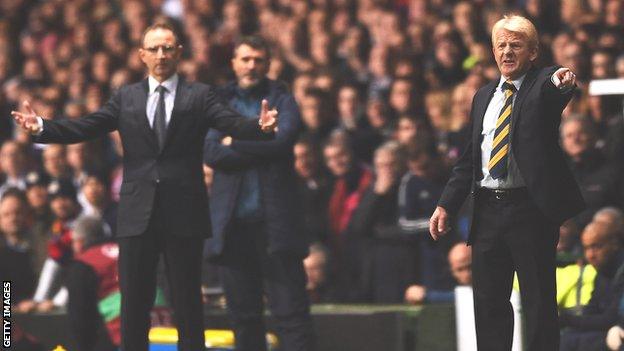
Martin O'Neill and Gordon Strachan are former managers of Celtic
Euro 2016 qualifier: Republic of Ireland v Scotland |
|---|
Venue: Aviva Stadium, Dublin Date: Saturday 13 June Kick-off: 17:00 BST |
Coverage: Live on BBC Radio Scotland, live text on BBC Sport website |
Scotland manager Gordon Strachan and his Republic of Ireland counterpart Martin O'Neill have been preparing for the Group D encounter between their teams for two weeks.
Within the context of the qualifying campaign, it is a significant encounter, not least because defeat for the Republic of Ireland would leave them five points behind Scotland with four games left to play.
The expectation is of a physical, fiercely-contested game in which familiar traits of commitment, aggression and sheer bloodymindedness will prevail.
There will still be room for moments of aplomb, though, since Shaun Maloney found the means to deliver an exquisitely conceived and executed winning goal when the teams met at Celtic Park last November.
Scotland's remaining Euro 2016 qualifiers | |
|---|---|
Republic of Ireland (a) | 13 June |
Georgia (a) | 4 September |
Germany (h) | 7 September |
Poland (h) | 8 October |
Gibraltar (a) | 11 October |
That strike - impudent and crisp - was the result of a set-piece strategy. Both managers will have planned meticulously for the game, although some of the best of their work is reserved for the motivation of players, and it is clear that there will be key areas and contests that will be influential in shaping the outcome of the game.
Pressure builds
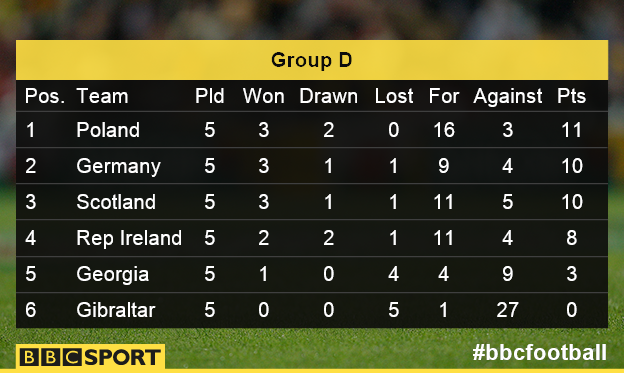
In some senses, Scotland are still playing catch-up. The team's form under Strachan has been reliably effective, with the only points dropped being the defeat away to Germany and a draw in Poland - both of which could have been reasonably anticipated - but it was unexpected that Poland would defeat Germany at home and that the Republic would earn a late draw in Germany.
The group table, then, is not as satisfying for the Scots as it might have been, but a win in Dublin would begin to alter that. Returning to Scotland with all three points would also reduce the pressure to earn a win in Georgia later in the campaign.
In truth, though, it is Ireland who carry the heavier psychological burden into the game.
The home side need to win all three points to keep alive their hopes of finishing in second or third place. A defeat would leave them not only adrift of Scotland, but playing catch-up in the final four games of the campaign, while a draw would suit Scotland more than their hosts.
Strachan v O'Neill
It was the Scotland manager who prevailed when the teams met last November, and he is also enjoying the more persuasive international management career. Strachan has restored the optimism of the Scotland support, whereas Ireland fans are still waiting for a decisive moment from O'Neill's management.
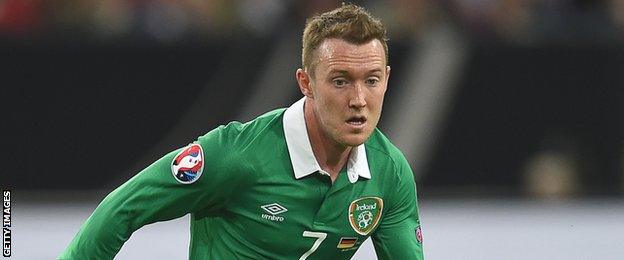
Paisley-born Aiden McGeady was booed by some Scotland fans when he played for the Republic of Ireland at Celtic Park in November
The latter's team selections have always contained an element of surprise, although some of the innovations - such as playing the winger Robbie Brady at left-back - have worked. Nonetheless, it has seemed as though O'Neill has been unsure how to best utilise the attacking talent of Aiden McGeady, or even how to deploy at all the Norwich playmaker Wes Hoolahan.
There is now a familiar spine to the Ireland side, with Shay Given, Seamus Coleman, John O'Shea, Marc Wilson, Brady, Glenn Whelan, James McCarthy and McGeady all certain to play if fit.
Strachan has an even more reliable line-up, with the team picking itself when everybody is fit. In particular, Strachan knows that he can rely on his attacking players - Shaun Maloney, Steven Naismith, Ikechi Anya and Steven Fletcher - to be creative but also diligent, and the consequence has been a hard-working Scotland side that has carried a threat going forward.
O'Neill's team has still shown traits typical of his management. Ireland tend to be strong and forceful, as well as relentless. McGeady's winning goal against Georgia, O'Shea's equaliser in Germany and Shane Long's equaliser at home to Poland all came in the 90th minute or later.
They are both principled managers, whose players tend to be at their most committed and determined when responding to their methods.
As well as coming down to which players best handle the pressure and hold their nerve, the outcome will also depend on which best execute their manager's instructions.
Individual battles
There will be critical confrontations across the field. Anya has proven to be a quick and direct figure playing on the left wing, but he will also have to count on the defensive side of the his game (he often plays at full-back for Watford) since he will be directly facing Seamus Coleman, the attacking Everton full-back.
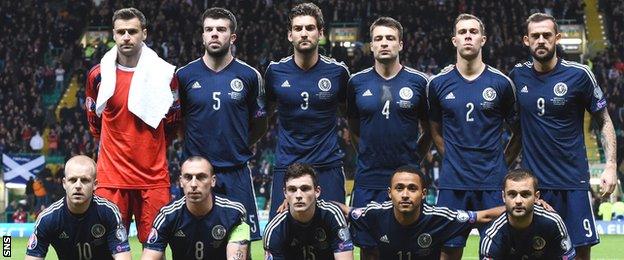
The Scotland team that played the Republic of Ireland in November: Back row (L-R): David Marshall, Grant Hanley, Charlie Mulgrew, Russell Martin, Steven Whittaker and Steven Fletcher. Front row (L-R): Steven Naismith, Scott Brown, Andrew Robertson, Akechi Anya and Shaun Maloney.
On the right wing, Maloney will hope to make the most of his guile against Brady, who has only been playing at full-back for 12 months and so remains something of a novice in that position.
Central midfield will be a fearsome battleground. Brown and most likely Charlie Mulgrew will face up to Whelan and McCarthy, and it was the former pairing who commanded that area of the field last November. They will need to be at their most dynamic and authoritative again in Dublin.
Scotland are at their most vulnerable in central defence, where Russell Martin will definitely play, alongside Mulgrew, possibly, or Gordon Greer. Martin has been in good form for Norwich this season, but he and Greer would be considered less mobile against the likes of Shane Long.
What is certain is that the two sides will be well-matched, competitive and combative.
- Published13 June 2015
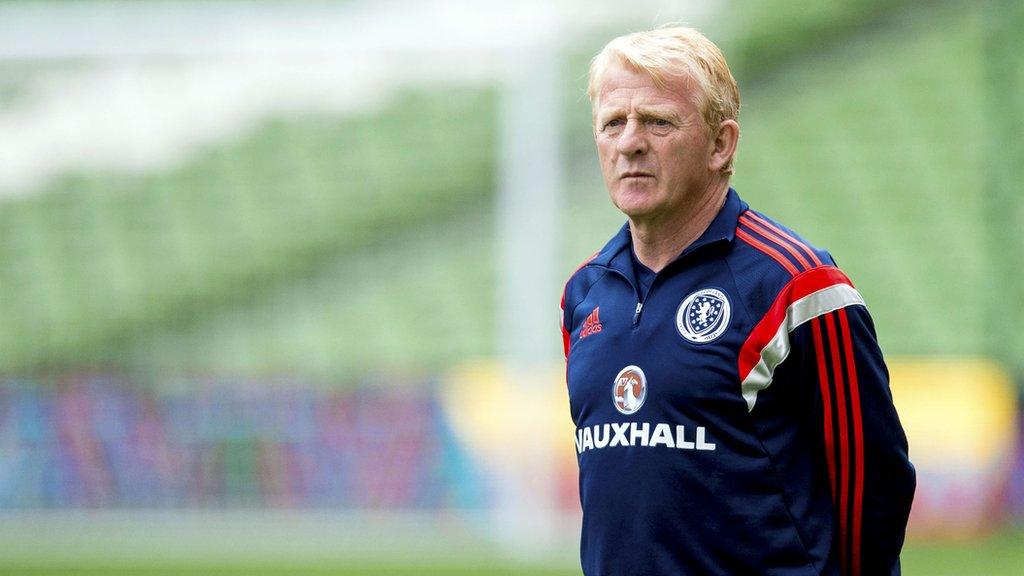
- Published12 June 2015
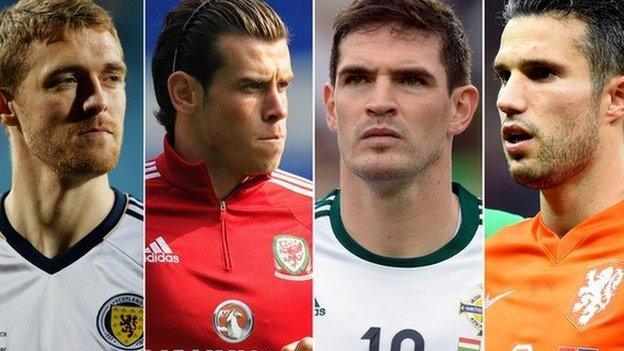
- Published12 June 2015
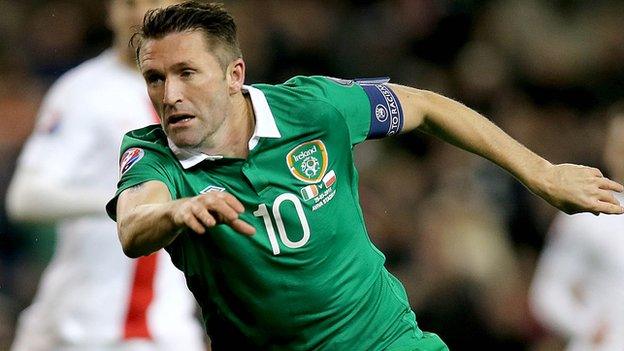
- Published13 June 2015
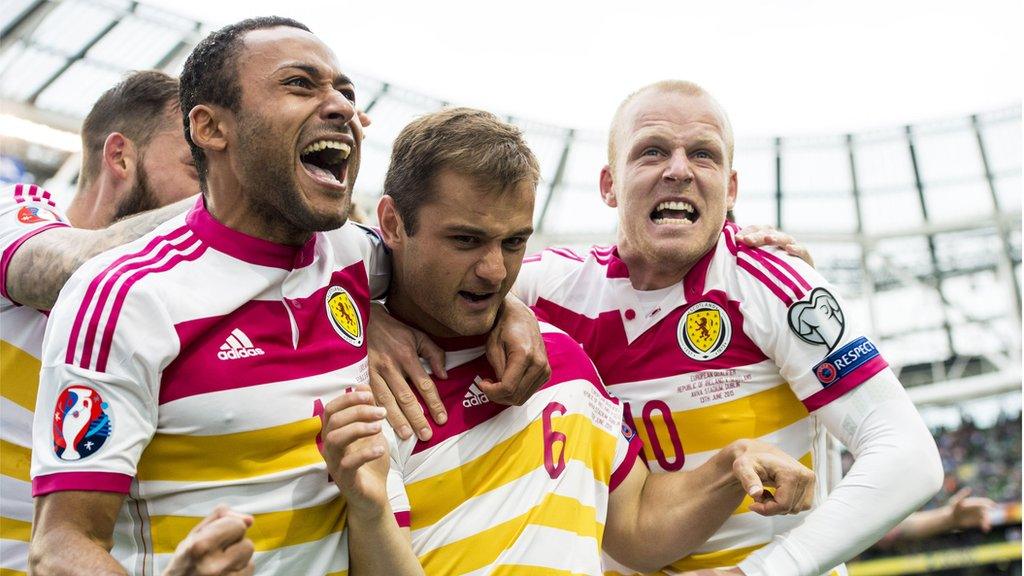
- Published7 June 2019

- Published20 June 2016
